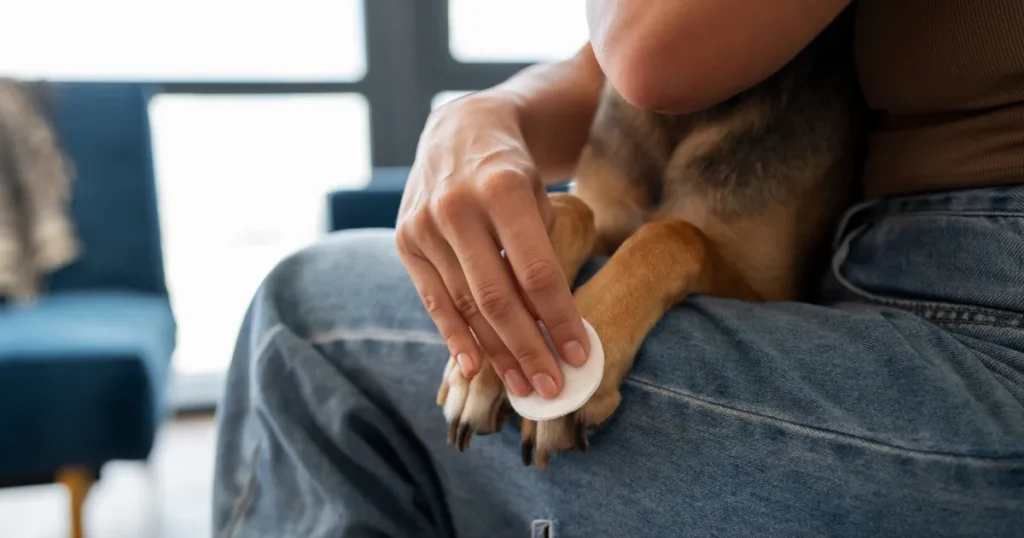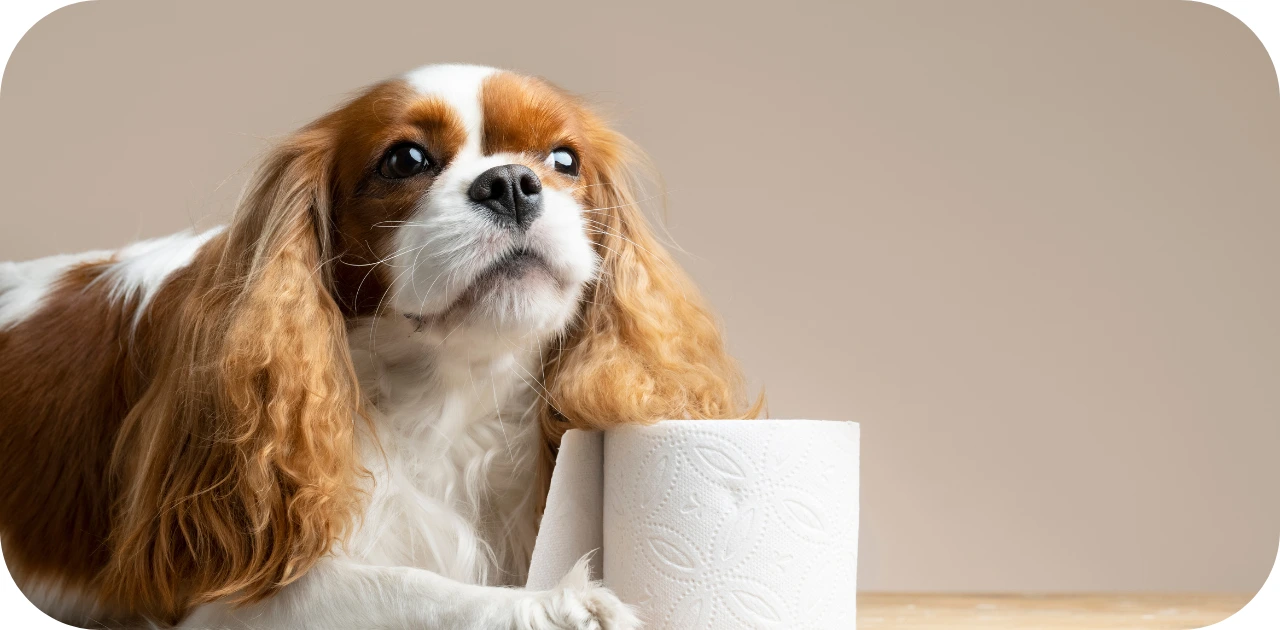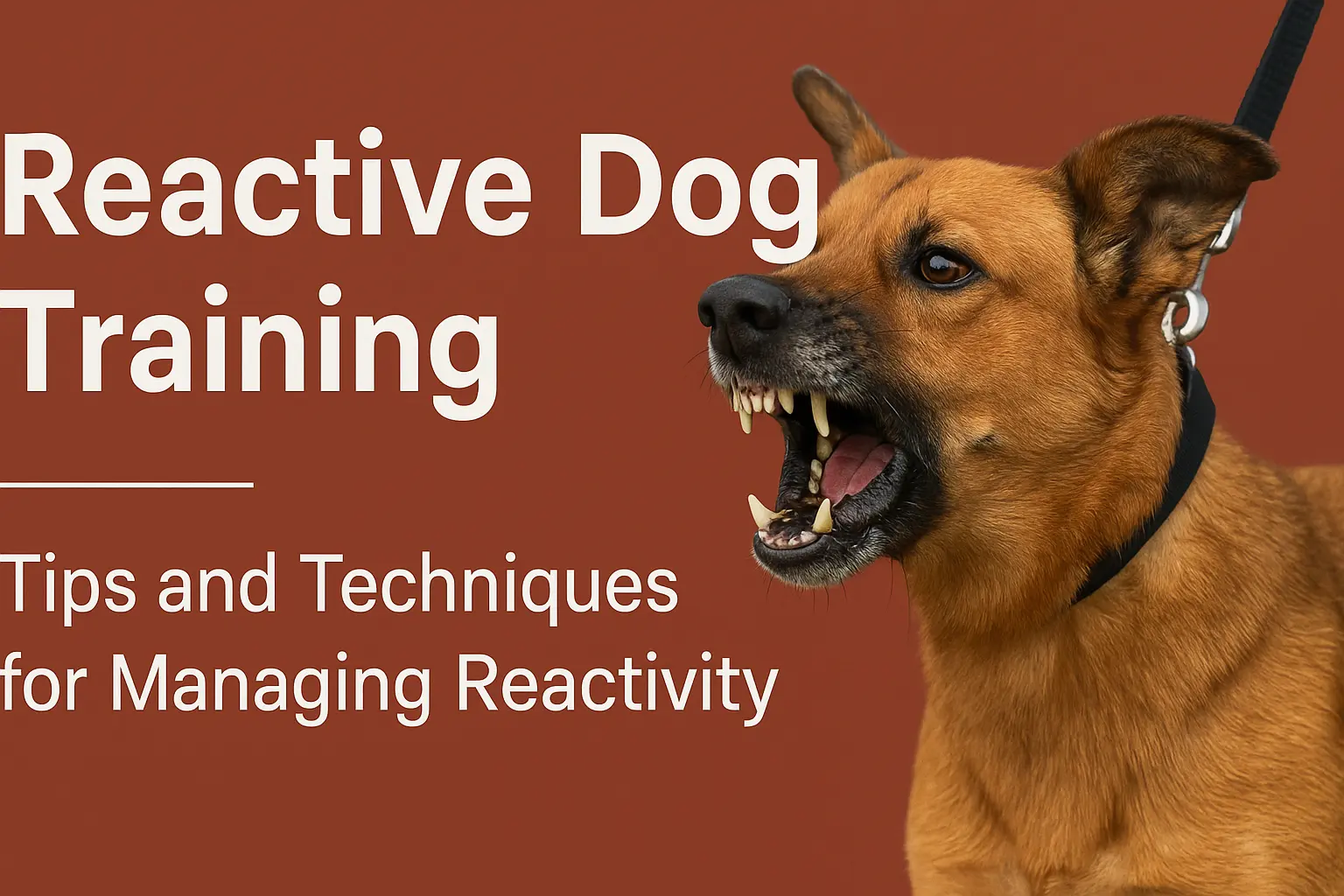Why Do Dogs Lick Their Paws? Surprising Causes & Smart Solutions
Why do dogs lick their paws? This common behavior can be harmless—or it could be a sign of something more serious. Whether it’s due to allergies, injury, anxiety, or infection, understanding the causes behind paw licking is key to keeping your dog healthy and happy. In this guide, we’ll explore every possible reason why dogs lick their paws and offer expert advice to help you identify the cause and fix the problem. If you’ve ever asked yourself, “Why do dogs lick their paws so much?”—you’re not alone.
Table of Contents
Knowing why dogs lick their paws can help you catch early signs of health problems and take action quickly. Many dog owners notice paw licking and wonder, “Is this something to worry about?” In many cases, yes—especially when the behavior becomes repetitive, obsessive, or leads to visible irritation. That’s why understanding why do dogs lick their paws is essential for every responsible pet owner.
If you’re searching online and asking “Why do dogs lick their paws constantly?” you’re not alone. This article breaks down the most common causes and treatments. Keep reading to uncover expert tips on how to stop this behavior and protect your dog’s health. Pet owners often find themselves asking, why do dogs lick their paws after walks, during sleep, or for no reason at all? No matter the situation, the answer usually ties back to either physical discomfort or emotional stress.
It’s important to understand why dogs lick their paws not only to treat the problem but also to prevent it from becoming a chronic habit. Regular paw checks and proactive care can make a huge difference. We’ll show you how. The more informed you are about why do dogs lick their paws, the more confident you’ll feel in responding to your dog’s needs.
So, why do dogs lick their paws so frequently? Sometimes it’s boredom, other times it’s pain, and in some cases, it’s simply a habit. Whatever the reason, recognizing it early can help you intervene before it leads to complications. This comprehensive guide will answer all your questions about why do dogs lick their paws and how to stop it.
Is It Normal for Dogs to Lick Their Paws?
Yes, it’s normal for dogs to lick their paws occasionally. Dogs groom themselves naturally, and some paw licking is part of their routine. However, when licking becomes frequent, intense, or leads to visible irritation, it’s a sign something might be wrong. Why do dogs lick their paws excessively? It could signal an underlying medical or behavioral issue that needs to be addressed.
Dogs may start licking their paws as a response to itching, pain, or anxiety. If you notice your dog licking the same paw repeatedly or licking both paws after every walk, you should ask yourself again: Why do dogs lick their paws? Identifying the specific trigger is key to solving the problem and providing your dog relief. The more you observe, the more clues you’ll gather to understand why dogs lick their paws in different situations.

Common Reasons Why Dogs Lick Their Paws
Allergies (Environmental & Food-Related)
Allergies are a leading cause of paw licking in dogs. Environmental allergens like pollen, dust, or grass can irritate a dog’s paws. Food allergies, particularly to common proteins like chicken or dairy, can also result in inflammation and itching.
Dry Skin or Irritated Skin
Dry climates or cold weather often cause dogs to develop flaky, itchy skin. Floor cleaners, lawn chemicals, or salt during winter walks may irritate the paws, prompting excessive licking.
Parasites and Insect Bites
Fleas, mites, ticks, and mosquito bites can all cause discomfort that leads to licking. Parasites often burrow between toes or near the paw pads, making them prime targets for a dog’s attention.
Injuries, Cuts, or Foreign Objects
Dogs might step on sharp objects or get small splinters or debris lodged in their paws. These minor injuries cause pain and discomfort, prompting your dog to lick the affected area.
Pain in the Paws or Legs
Dogs may lick a paw due to joint or leg pain. Older dogs with arthritis or hip dysplasia often display this behavior as a form of self-soothing.
Boredom and Anxiety
Mental stimulation is crucial for dogs. Without it, they might engage in repetitive behaviors like licking to cope with stress or loneliness.
Habitual or Compulsive Behavior
If left unchecked, licking can become a compulsive habit. This might continue even after the original cause is resolved and may require professional behavioral help.
Medical Conditions That Cause Paw Licking
Yeast and Bacterial Infections
Warm, moist areas between a dog’s toes can harbor infections. Symptoms include redness, swelling, a strong odor, and persistent licking.
Interdigital Cysts
These painful bumps or abscesses form between the toes and can make walking uncomfortable. Dogs will instinctively lick the area to ease the pain.
Arthritis or Joint Pain
Dogs experiencing arthritis or related joint problems may lick their paws to relieve discomfort, particularly after activity.
Autoimmune Diseases
Conditions like lupus or pemphigus can cause painful sores on paws, triggering licking as the dog tries to soothe irritation.
Behavioral Reasons Why Dogs Lick Their Paws
Stress or Separation Anxiety
Dogs under emotional stress often develop habits like licking as coping mechanisms. Common triggers include loud noises, household changes, or being left alone for extended periods.
Lack of Mental Stimulation
Without adequate playtime or challenges, dogs may turn to licking as a form of self-entertainment.
Attention-Seeking Behavior
Some dogs learn that licking gets a response from their owners. They may continue the behavior to attract attention, even if it’s negative.
When Should You Worry About Excessive Licking?
Red Flags to Watch For
- Red or bleeding paws
- Hair loss or bald spots
- Swelling or limping
- Foul odors or visible discharge
What Is Considered Excessive?
When a dog licks one or both paws repeatedly throughout the day, to the point of causing redness or open wounds, it’s considered excessive.
How to Monitor the Behavior Over Time
Use a daily log to track your dog’s licking habits, environmental changes, diet, and stress levels. This can help pinpoint triggers.
How to Diagnose the Cause of Paw Licking
What Your Vet Will Look For
Your vet will check for signs of injury, infection, inflammation, and behavioral triggers.
Tests and Examinations
These may include skin scrapings, allergy tests, X-rays, or fungal cultures depending on symptoms.
Keeping a Symptom Journal at Home
Note everything your dog eats, plays with, walks on, or reacts to. This can be critical in identifying the cause of paw licking.
How to Stop a Dog from Licking Their Paws
Treating Allergies and Infections
Veterinarians may prescribe antihistamines, antifungal creams, or medicated shampoos depending on the condition.
Managing Stress and Anxiety
Calming sprays, supplements, and professional behavior training can help relieve emotional triggers.
Using Dog Boots or Cones
Protective gear can prevent licking while treatment takes effect and healing occurs.
Dietary Changes
A hypoallergenic diet or omega-3 supplements may reduce inflammation and promote healthy skin.
Keeping Paws Clean and Dry
Wipe paws after walks and avoid harsh floor cleaners or yard chemicals that can cause irritation.
Natural Remedies for Dogs Who Lick Their Paws
Oatmeal Soaks
Soaking paws in oatmeal-infused water for 10 minutes can relieve itching.
Coconut Oil and Natural Balms
Coconut oil has anti-bacterial properties and soothes dry skin.
Herbal Sprays and Supplements
Sprays with chamomile or calendula offer natural relief. Always consult your vet before adding supplements.
How Vets Treat Chronic Paw Licking
Medications and Prescriptions
Depending on the cause, vets may recommend antibiotics, anti-inflammatories, or steroids.
Allergy Testing and Immunotherapy
Testing helps identify allergens, and treatment plans like desensitization therapy can reduce symptoms over time.
Behavioral Therapy
For compulsive licking, behavior modification techniques or medications like fluoxetine may be prescribed.
Can Dogs Harm Themselves by Licking Their Paws Too Much?
Risks of Infection
Open sores are vulnerable to bacterial infections that worsen the problem.
Skin Damage and Hair Loss
Chronic licking leads to thickened skin, hot spots, and hair loss.
Long-Term Effects if Left Untreated
Compulsive licking can become ingrained behavior, requiring long-term management.
Preventing Future Paw Licking Episodes
Paw Care Tips
Trim nails regularly, moisturize paw pads, and inspect feet for debris after walks.
Regular Grooming
Clean fur around paws to avoid matting and reduce allergen buildup.
Mental Enrichment Ideas
Puzzle toys, training games, and varied walks help reduce stress and boredom.
Frequently Asked Questions (FAQs)
Why does my dog lick only one paw?
This may signal a localized injury, sting, or foreign object. A vet should examine it.
Is licking paws a sign of pain?
Yes. Dogs often lick areas that hurt, including joints and soft tissue injuries.
Can food allergies cause dogs to lick paws?
Definitely. Food sensitivities often manifest as itching, especially on the paws.
Should I use a cone to stop the licking?
A cone can help prevent damage during healing, but it doesn’t solve the root issue.

Final Thoughts: Understanding Why Dogs Lick Their Paws
Understanding why dogs lick their paws is key to helping them stay healthy and happy. Whether it’s due to allergies, stress, or an injury, early detection and proper care make all the difference. Monitor your dog’s behavior, seek veterinary help when needed, and take steps to ensure both their physical and emotional needs are met.







